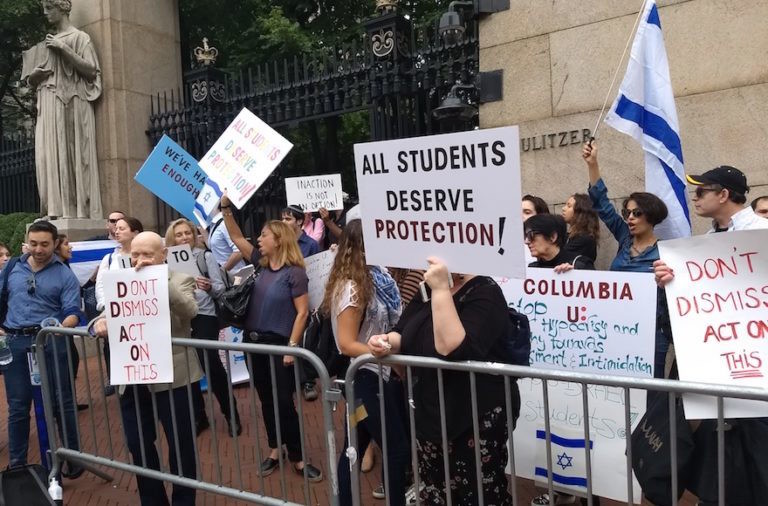Columbia U’s Center: Ramallah on the Hudson
The Trump administration may have closed the PLO’s Mission in Washington, but its Morningside Heights Mission is open for business.
I refer to Columbia University’s Center for Palestine Studies (CPS), an Ivy League clearinghouse for PLO propaganda and the demonization of Israel. Call it the PLO’s American academic wing.
When the CPS opened more than eight years ago, founding co-director Rashid Khalidi promised that it would avoid doing “anything that’s directly related to any political activism.”
This is laughable. What Khalidi meant is that the CSP would not participate in anti-Israel activism, but this is a lie. The faculty members who comprise the center’s experts are rivaled only by the faculty of Birzeit University in Ramallah for their anti-Israel advocacy.
It might, in fact, take a Center for Palestine Studies to examine thoroughly the history of Palestinian organizations devoted to political violence. Instead, Columbia has assembled the anti-Israel all-stars of academia, such as Joseph Massad, who has called for “the continuing resistance of Palestinians in Israel and the Occupied Territories to all the civil and military institutions that uphold Jewish supremacy.”
Another member is Hamid Dabashi, who wrote that Israel is a “key actor” in “every dirty treacherous ugly and pernicious act happening in the world.”
In addition to being a professor at Columbia’s Middle East Institute and co-director of the CPS, Khalidi also happens to be a former member of the PLO, as Martin Kramer has shown. Not since Columbia hired former Weather Underground member Kathy Boudin at its School of Social Work has it given a platform to “reformed” terrorists. At least Boudin expressed remorse. Not so Khalidi, whose views have remained consistent since his PLO days, though now masked in the academic patois of post-colonialism.
Brinkley Messick, the CPS’s other founding co-director, hyped it as the first academic center devoted to the study of Palestinian Arabs. “Very simply,” he gushed, “there’s never been a dedicated space … for this kind of research.”
He was partly right. Columbia has a Middle East Institute, but the CPS brought together faculty from beyond Middle East Studies, all dedicated to delegitimizing Israel and whitewashing Palestinian violence. Several have even been immortalized in The David Project’s documentary Columbia Unbecoming (2004) where their purported reluctance to be political is exposed as fraudulent.
The CPS has spent the past eight years spreading the three key elements of PLO propaganda: minimizing terrorism, delegitimizing Israel, and altering history.
Yasser Arafat was the pioneer of minimization. In 1974, he told the United Nations, “Whoever stands by a just cause and fights for the freedom and liberation of his land from the invaders, the settlers and the colonialists, cannot possibly be called terrorist.”
Delegitimizing Israel has always been a PLO priority; the academic version is BDS. And finessing history by portraying the Arabs who refused a state in 1948 as victims of European Jewish aggression is the third component of the propaganda strategy.
The CPS echo chamber attracts students who revile Israel and equips them with fashionable postmodern jargon to dress up their hatred. Students who support Israel know enough to stay away.
The rare few who genuinely seek dialogue and debate are feared. Rather than engage in civil debate, the CPS isolates and excludes them, fostering an atmosphere of harassment, especially against members of Students Supporting Israel (SSI), an organization founded to oppose campus BDS activists.
Columbia SSI chapter president Dalia Zahger, and vice president Ofir Dayan, both IDF veterans, shared their experiences as targets of harassment, some by members of Columbia University Apartheid Divest (CUAD), a joint venture of Students for Justice in Palestine (SJP) and Jewish Voice for Peace (JVP).
Dayan said she has been approached by anti-Israel students screaming, “Stop killing Muslim babies,” “You’re a murderer,” and “Zionist, get out!” Zahger reports that she has been compared to a Hamas terrorist and accused of “spitting on [her] ancestors’ ashes in Europe.”
On April 9, 2018, they attended an event, “On the Palestine Exception (with some thoughts concerning anti-Semitism, Islamophobia, and Zionism in the academy).” The speakers were anti-Israel ideologues: Massad; Jasbir Puar, professor of gender studies at Rutgers University; and Gil Hochberg, professor of comparative literature at UCLA and also the Ransford professor of Hebrew and comparative literature, and Middle East studies at Columbia.
When members of CUAD saw Dayan looking at her phone, they accused her of recording the event and called campus safety officers. When Dayan refused to hand over her phone, she, Zagher, and other SSI members were escorted from the event. So much for academic freedom.
When they registered complaints with the university, Zagher was asked why she attends such events when she knows they will be “problematic and tense.” The executive vice president for student life told Dayan that the university “has no authority to take measures against SJP unless they become violent.” She was advised to “put campus safety on speed dial.”
There is no doubt that anti-Israel political activism in the classroom leads to anti-Semitism outside it. Statistics show that anti-Semitic incidents are far more likely to occur at universities where BDS events are hosted. Clearly, the CPS fosters an atmosphere that encourages anti-Semitism.
If Columbia University abides by the International Holocaust Remembrance Alliance’s working definition of anti-Semitism (as adopted by both the State Department and Department of Education), it will have to re-examine both the work and influence of the Center for Palestine Studies, where the professors for the liberation of “Palestine” are trying to turn the Upper West Side into the Upper West Bank.
A.J. Caschetta is a lecturer at the Rochester Institute of Technology and a fellow at Campus Watch.

 46.0°,
Light Drizzle
46.0°,
Light Drizzle 




